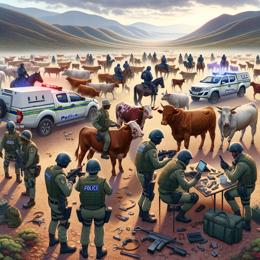Image created by AI
Cameroonian Court Concludes Investigation into Journalist Martinez Zogo’s Murder
The Yaoundé military court in Cameroon has officially wrapped up its judicial investigation into the harrowing murder of journalist Martinez Zogo, marking a significant milestone in a case that has grabbed national and international headlines, shining a spotlight on the state of press freedom in the Central African nation.
Martinez Zogo, the former director of Radio Amplitude FM, was a prominent voice in Cameroonian journalism, known for his fearless coverage of corruption and financial misconduct among the country's elite. His show, "Embouteillage," often delved into issues that many would consider untouchable, questioning and naming influential figures despite potential repercussions.
The closure of the investigation by the military court signifies the onset of a trial that holds significant weight for journalism in Cameroon. Around twenty individuals, including high-ranking officials and a businessman, are facing various charges related to the case. Key among these are three members of the Directorate-General for External Research (Direction générale de la recherche extérieure - DGRE), Cameroon's counter-espionage service, who are now being indicted for assassination.
Notably, among the accused is the head of the DGRE, Léopold Maxime Eko Eko, who is suspected of having ordered or provoked the torture that led to Zogo's death. The depth of his involvement was a crucial element in the investigation, with Eko Eko being confronted by accuser Justin Danwe and other DGRE agents to determine the veracity of claims that a meeting was conducted where an audio tape allegedly featuring defamatory remarks by Zogo was played.
These damning allegations stand countered by joint declarations from Eko Eko, Danwe, and other witnesses, asserting that no such meeting ever took place—a discrepancy that the magistrates noted in their documentation according to a report by Jeune Afrique magazine.
The trial is set to proceed in the coming weeks, marking the next chapter in a saga that has held the nation’s attention. It also comes at a time when Cameroonian President Paul Biya ordered a thorough investigation into the murder following Zogo's abduction and the shocking discovery of his tortured body near Yaoundé last year.
Zogo's death was met with national outrage and international condemnation, with NGOs and fellow journalists calling for justice and highlighting the danger that corruption poses to freedom of speech. The international community, including organizations like Reporters without Borders, has expressed skepticism over the trial’s outcome, hinting at the potential influence of high-level state operatives.
The upcoming trial will not only seek to deliver justice for Martinez Zogo but will also test the country's judiciary's independence and willingness to uphold the rights of journalists. As the world watches, Cameroon is at a crossroads, with the opportunity to take a definitive stand against the forces that seek to silence the free press.










